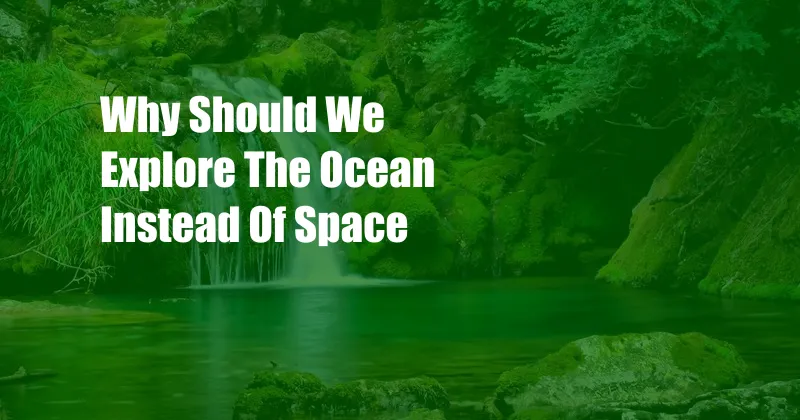
Why Explore the Ocean Instead of Space?
When pondering beyond our terrestrial abode, we often turn our gaze skyward, mesmerized by the celestial allure of outer space. Однако, beneath our very feet lies another captivating frontier, teeming with uncharted territories and untapped potential: the vast ocean. While the allure of space exploration remains undeniable, compelling arguments can be made for prioritizing our exploration efforts towards the depths of our own planet.
The Ocean’s Relevance: A Vital Resource for Humanity
Covering over 70% of the Earth’s surface, the ocean plays a crucial role in sustaining life on our planet. It absorbs and stores vast amounts of carbon dioxide, regulating global climate patterns. Its waters provide sustenance to a myriad of marine life, constituting a vital food source for billions of people worldwide. Moreover, the ocean harbors countless undiscovered natural resources, holding immense potential for medical advancements, energy production, and economic development.
The Ocean’s Uncharted Frontiers: A Bounty of Discoveries
In contrast to the vast expanse of space, which remains largely unexplored, our knowledge of the ocean is still in its infancy. Over 95% of the ocean floor remains unmapped, concealing countless undiscovered species, ecosystems, and geological formations. Exploring these uncharted regions promises to uncover novel scientific insights, expand our understanding of Earth’s history, and provide vital information for conservation and sustainable resource management.
The Ocean’s Economic Potential: A Sustainable Path Forward
Beyond its ecological significance, the ocean holds immense economic potential. By investing in ocean exploration, we can unlock new sources of food, energy, and raw materials. Sustainable fishing practices, aquaculture, and marine biotechnology offer promising avenues for economic growth and job creation. Moreover, ocean tourism and recreational activities can provide a vital source of income for coastal communities.
The Ocean’s Environmental Imperative: Addressing Climate Change
As the world grapples with the challenges of climate change, the ocean plays a pivotal role. Not only does it absorb carbon dioxide, but it also releases vast amounts of oxygen into the atmosphere. Understanding and mitigating the effects of climate change necessitates a thorough understanding of the ocean’s role in the Earth’s climate system. By exploring the ocean, we can develop strategies for carbon sequestration, marine protected areas, and sustainable coastal development.
The Ocean’s Ethical Obligation: Preserving Our Planet
Exploring the ocean is not merely an endeavor for scientific advancement or economic gain. It is an ethical obligation. The ocean sustains life on Earth, provides us with countless benefits, and faces unprecedented threats from pollution, overfishing, and climate change. By exploring the ocean, we can gain a deeper understanding of its intricate ecosystems and develop informed policies for its conservation and sustainable management.
Tips and Expert Advice: Embracing a Holistic Approach to Ocean Exploration
To maximize the benefits of ocean exploration, a holistic approach is crucial. This involves integrating interdisciplinary research efforts, fostering collaboration between scientists, policymakers, and industry leaders, and engaging the public in ocean literacy and conservation efforts. Partnerships between government agencies, research institutions, and non-profit organizations are vital to ensure sustainable and effective exploration practices.
Experts emphasize the importance of developing advanced technologies for deep-sea exploration, including autonomous underwater vehicles, submersibles, and remote sensing systems. These tools enable scientists to access remote and inaccessible areas of the ocean and collect critical data on marine life, ecosystems, and geological formations. Additionally, investing in data management and analysis is essential to translate vast amounts of exploration data into actionable insights.
FAQ: Delving Deeper into Ocean Exploration
Q: Why is the ocean so unexplored?
A: The ocean’s vast size, depth, and harsh conditions make it challenging and expensive to explore. Technological limitations and the logistic difficulties of operating in underwater environments also contribute to the low level of exploration.
Q: What are the potential benefits of ocean exploration?
A: Ocean exploration offers a wide range of benefits, including scientific discoveries, economic development, food security, energy production, climate change mitigation, and conservation.
Q: What are the challenges facing ocean exploration?
A: Ocean exploration faces challenges such as technological limitations, funding constraints, political and legal barriers, and environmental concerns. Climate change and its impacts on marine ecosystems also pose significant challenges.
Conclusion: Embracing the Unfathomable Depths
While the allure of space exploration persists, it is time to recognize the paramount importance of exploring the ocean. The ocean offers uncharted frontiers to discover, countless resources to harness, and vital insights for addressing global challenges. By prioritizing ocean exploration, we can unlock a sustainable and prosperous future for humanity, while safeguarding the health and well-being of our planet. Are you ready to dive into the unfathomable depths and embark on the exploration of the vast and enigmatic ocean?